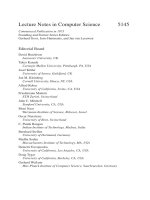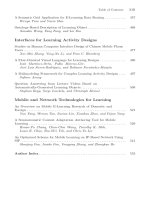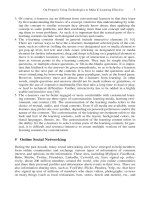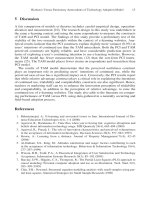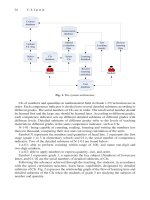Lecture Notes in Computer Science- P63 ppt
Bạn đang xem bản rút gọn của tài liệu. Xem và tải ngay bản đầy đủ của tài liệu tại đây (142.77 KB, 5 trang )
Multi-agent Framework Support for Adaptive e-Learning 299
ourseware ecommendation gent is in charge of recommending a personalized
learning courseware to learner according to learner’s ability and courseware’s diffi-
culty. The system architecture is shown as Fig. 1.
2.2 Interface Design
The interface of the system includes two parts : learner interface and teacher\expert
interface,
which are managed by learner interface agent and teacher interface agent.
The learner interface agent provides a flexible learning interface to interact with
learners, conveys the learners’ feedback information and testing results to the
iagno-
sis/assessment
gent, receives the recommendation coursewares from the daptive
avigation gent,and then, displays the coursewares to the learners. Through the
learner interface agent,
learners can choose interesting course categories and units to
study and use on-line helping to solve the encountered problems during the learning
process. Learners can also enter appropriate keywords for searching the needed
courseware through the system’s search mechanism during learning process. If a
learner visits the personalized learning system for the first time,
he/she must register
as a legal user by inputting his/her individual basic information,
and then the learner
interface agent stores these individual basic information to
earner ccount atabase
through the
atabase anagement gent.
Teacher/Expert
nterface gent provides a friendly interface to interact with
teachers or experts. Through
nterface gent, teachers or experts can up-
load, delete, or revise courseware and testing items stored in the
ourseware eposi-
tory
nd esting items atabase. eachers can also manager the nswer ocument
stored in
nswer ocument epository, give training cases to train the uto- eply
gent for automatical answering students’ questions.
2.3 Personalized Web-Based Tutoring
The personalized web-based tutoring module includes three agents: diagno-
sis/assessment agent, adaptive navigation agent and courseware recommendation
agent. The three agents through a standard protocol, collaborate with each other to
achieve personalized tutoring. After a beginner logs into, the diagnosis/assessment
agent will give a questionary for collecting learner’s profile information(learner’s
behaviors, interests, cognitive characteristics, knowledge level and ability) and store
these profile information to learner profile database for providing personalized tutor-
ing services, and then conveys learner’s profile information to courseware recom-
mendation agent and adaptive navigation agent. The courseware recommendation
agent based on learner’s profile information estimates learner ability, and then selects
suitable difficulty levels courseware for learner[12]. Based on the learner’s profile
information and coursewares recommended by courseware recommendation agent,
the adaptive navigation agent conduct personalized curriculum sequencing for
learner[9], meanwhile, communicates with the learner interface agent to guide the
learning contents according to the planned learning path for individual learner and the
learning processes of individual learner are also recorded into the learner profile data-
base for personalized tutoring. After learner finishes the entire courseware planed by
300 W. Liang, J. Zhao, and X. Zhu
the personalized tutoring system module, the adaptive navigation agent will notice the
diagnosis/assessment agent to randomly generate a testing sheet to the learner for per-
forming a post-test in order to evaluate learning performance. The generated testing
sheet in a post-test will be transformed to learner interface agent, and then displayed
to the learner. The post-test results are also provided to the learner for self-
examination and stored into the learner profile database. So far, the learner finishes
the entire learning process for a learning course unit.
2.4 On-Line Helping
If learners encounter problems during the learning process, their learning perform-
ances could be significantly devastated due to no instant aid. So, online helping sys-
tem is very important for an adaptive e-learning system[10].In this multi-agent
framework, the on-line aid function is undertaken by auto-reply agent. The auto-reply
agent can automatically reply most of the questions submitted by the students with the
answers provided by the teachers. If no feasible answer[11] can be found in the an-
swer document repository, the agent will forward the questions to the teacher/expert
interface agent, and then the auto-reply agent will remind and assist teacher in an-
swering the question. Once the new answer is available, the system will send it to the
learner via the learner interface agent. Moreover, the teachers can review all of the
questions submitted by the learners and the answers replied by the systems with cor-
responding satisfaction degrees rated by the learners, which is helpful to the teacher in
realizing the learning status of each learner and the performance of the system.
2.5 Courseware/Testing Items Management
The courseware/testing items management agent administers the details of maintain-
ing the courseware repository and testing items database. The agent provides lots of
robust functions for teachers to upload, delete, or revise the content of courseware in
the courseware repository. Through the agent, experts can design testing items for
learning content. Because all coursewares in the courseware repository have followed
the standard of SCORM 1.2 (Sharable Content Object Reference Model) metadata
information model (Advanced Distributed Learning)[14],the agent can exchange
courseware with other e-learning systems.
3 Experiment and Evaluation
Based on the multi-agent framework, an adaptive e-learning system has been im-
plemented. The proposed system is implemented on the platform of J2EE. More-
over, the genetic algorithm, data mining algorithm and machine learning are used to
implement this system. Fig.2. is one of the learner’s interface. To verify the sys-
tem’s effectiveness for the proposed personalized intelligent learning system, some
high school students were invited to test this system. To evaluate learners’ satisfac-
tion degree for the proposed personalized e-learning system, a questionnaire which
involves many questions distinguished six various question types(table1) were
Multi-agent Framework Support for Adaptive e-Learning 301
Table 1. The six question types
Question type Description
The satisfy of
system services
To investigate whether learners satisfy the provided
learner interface and course materials
Learning interests
To investigate whether learners are interested in using the
proposed adaptive e-learning system for mathematical
learning
learning mode
To investigate whether learners can accept the proposed
learning mode with personalized tutoring
learning interction
between teachers
and learners
To investigate whether the proposed adaptive e-learning
system affects learning interaction between teachers and
learners
learning attitude
To investigate whether learners with computer use the
proposed personalized e-learning system for learning at
home
learning
performance
To investigate whether the proposed personalized
e-learning system can promote learners’ learning
performances and confidence
Fig. 2. The learner’s interface
302 W. Liang, J. Zhao, and X. Zhu
designed to measure whether the propose.There are totally 216 effective question-
naires filled out by learners who participated in this experiment. Among 216 effec-
tive questionnaires, 78% learners selected “strongly agreed” or “agreed” items,13%
learners selected “neutrality” items, only 9% learners selected “strongly disagreed”
or “disagreed” items. The investigation result illustrates that the multi-agent adap-
tive e-learning framework is high feasible and robustd e-learning system satisfied
the real requirements of most learners.
4 Conclusions
This paper proposed a multi-agent framework for building adaptive e-learning system.
The proposed architecture considered all indispensable functions which include diagno-
sis(assessment),online-helping, adaptive navigation and courseware recommendation,
and so on, in the personalized e-learning system. This paper makes a critical contribu-
tion: proposed a multi-Agent framework to realize an adaptive e-learning system. The
experiment also demonstrated that the system can efficiently and splendidly perform
personalized web-based tutoring works. However, the project is still in its early stages;
there are still a lot of works left to be done and there are still many open design and im-
plementation issues. Additionally, in order to improve the system in terms of functional-
ity and efficiency, some design aspects need further investigation.
Acknowledgment
This material is based upon work funded by Zhejiang Provincial Natural Science
Foundation of China under Grant No.Y107750
Thanks to the financial support from
Natural Science Foundation of China with granted number 60773197.
References
1. Lu, S.: The research and application of multi-agent technology in the Network educa-
tion[D]. Nanjing University of Technology (2004)
2. Qin, Y.: Concept of agent and its application in network teaching environment[J]. FuJian
Computer 8, 29–30 (2003)
3. Ming, Z.: The research of intelligent distance teaching system based on agent[D]. School
of foreign Languages central China Normal University (2007)
4. Wooldridge, M.J., Jennings, N.R.: Software engineering with agents: pitfalls and prat-
falls[J]. IEEE Internet Computing 3(3), 20–27 (1999)
5. Bellifemine, F., Poggi, A., Rimassa, G.: Developing multi agent systems with a FIPA-
compliant agent framework[J]. Software - Practice &Experience 31, 103–128 (2001)
6. Changjie, T., Lau, R.W.H., Qing, L., Huabei, Y., Tong, L., Kilis, D.: Personalized course-
ware construction based on web data mining[J]. In: Proceedings of the first IEEE interna-
tional conference on web information systems engineering, vol. 2, pp. 204–211 (2000)
7. Chen, C M., Duh, L J.: Personalized web-based tutoring system based on fuzzy item re-
sponse theory[J]. Expert Systems with Applications, 1–18 (2007)
Multi-agent Framework Support for Adaptive e-Learning 303
8. Chen, C M.: Intelligent web-based learning system with personalized learning path guid-
ance[J]. Computers & Education, 1–28 (2007)
9. Chen, C M., Liu, C Y., Chang, M H.: Personalized curriculum sequencing using modi-
fied item response theory for web-based instruction[J]. Expert Systems with Applica-
tions 30(2), 378–396 (2006)
10. Hwang, G J., Yin, P Y., Wang, T T.: An enhanced genetic approach to optimizing auto-
reply accuracy of an e-learning system[J]. Computers & Education, 1–17 (2007)
11. Tseng, J.C.R., Hwang, G.J.: Development of an automatic customer service system on the
internet. Electronic commerce research and applications, 9, doi:10.1016/j.elerap.2006,04.009
12. Tseng, J.C.R., Hwang, G.J.: A novel approach to diagnosing student learning problems in
e-learning environments. WSEAS Transactions on Information Science and Applica-
tions 1(5), 1295–1300 (2004)
13. Lind, J.: Issues in agent-oriented software engineering. In: First international workshop on
agent-oriented software engineering (AOSE 2000), Limerick, Ireland (2000)
14. Huang, Y M., Chen, J N., Huang, T C.: Standardized course generation process using
Dynamic Fuzzy Petri Nets[J]. Expert Systems with Applications 34, 72–86 (2008)
15. Zhao, J., Zhu, X.: The Technology of Visual C++ Programming Based on Microsoft Agent
COM[J]. Microelectronics & Computer 10, 59–62 (2002)

